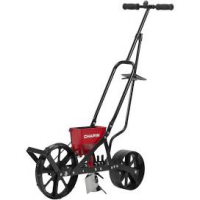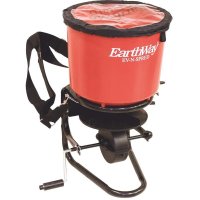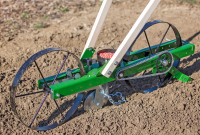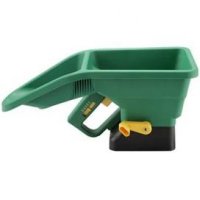The numbers provided by
@camonick are pretty good, ballpark, estimates. As he noted, your location will make a big difference in what you can expect. If you’re contemplating doing this on a rooftop garden scale- well, you may have to lease space on some adjacent rooftops.

The cereals which fall under the designation “small grains” can, and are, used for brewing. These would include wheat, barley, oats, rye, and some less common cereals such as spelt and triticale. So called “coarse grains“, such as corn and grain sorghum, are also used in brewing. Any of these crops are going to require between 500 and 1000 square feet to produce around a bushel of grain. The amount of work required to plant, tend, harvest, and process your crop will make this the most expensive way to produce beer on the homebrew scale, even if you only value your time at minimum wage level.
Harvesting the crop will be the most time consuming part of the process. Separating the kernels from the plant is incredibly labor intensive when done the old fashioned way of cutting the stems off at ground level, spreading the stalks on a flat surface, and beating the hell out of the heads with a big stick. After that exercise you will have to figure out how to gather up the tiny seeds separately from the straw and chaff. A single wheat or barley seed will, typically, produce 3 or 4 stems, each of which will produce a head where the seeds form. The head on the main stem will contain 30-40 kernels. The additional stems, called “tillers”, will produce 20-30 kernels each. So, one plant will produce around 100 kernels which will weigh about 3 or 4 grams. To brew a gallon of beer you will need several pounds of grain. There are 28 grams in an ounce and 16 ounces in a pound. At 30 kernels/gram there are over 800 kernels in an ounce and over 13,000 in a pound. Harvesting, threshing, and separating grain manually is the equivalent of picking fly poop out of pepper. But, hey, you can say “I grew this beer by myself”, while wondering how long it will be before your fingerprints grow back.
I’ll leave it up to
@bracconiere, our resident home maltster, to describe the malting process.












![Craft A Brew - Safale S-04 Dry Yeast - Fermentis - English Ale Dry Yeast - For English and American Ales and Hard Apple Ciders - Ingredients for Home Brewing - Beer Making Supplies - [1 Pack]](https://m.media-amazon.com/images/I/41fVGNh6JfL._SL500_.jpg)


















































